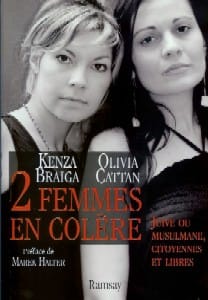Should we be tolerant of the enemies of tolerance? The revolutionaries of 1793 were already pondering this question regarding the enemies of the young Republic.
They followed in the footsteps of the Enlightenment philosophers, forgetting that some of them, like Voltaire, were sometimes more inclined to attack “the infamous” aspect of religion rather than criticize autocrats who provided them with shelter and sustenance. It is religion, specifically, that the book “Two Angry Women” fiercely addresses. These two women, ostensibly opposites: one, a Sephardic Jew born in Algeria, the other, a Muslim of Iraqi origin. Yet, a common struggle has united them: the confinement of women within religious beliefs that reduce their existence to an endless list of prescriptions, prohibitions, and obligations. From their “starting environment” to their “arrival” environment, to use the terms of Alain Touraine (in an excellent book on women we will discuss soon), a courageous maturation emerges.
According to them, religious authorities have hijacked the revelatory power of the “Book” and vampirized ecclesiastical institutions for their benefit. Because they have experienced them daily and still suffer from them, Olivia Cattan and Kenza Braiga indiscriminately denounce all forms of injustice, racism, and anti-Semitism, before focusing their criticism on the sad fate of women under radicalized interpretations of Islam and Judaism. They declare themselves more driven by spirituality than by religious asceticism, another point that resonates with ideas expressed by Alain Touraine. According to Olivia, the Jewish woman is subjected to “purification rituals” that she perceives as infringing on her “intimacy.” In Judaism, the woman who gives life encroaches on the domain of the Ineffable and seems to disturb the strict separation between man and a God so inaccessible that it is impossible to name Him.
Kenza tells us that in the Islam she experienced, any “display of femininity” is seen as “a sexual provocation.” Yet, the two authors simply remind us of a fact already stated by Freud: since time immemorial, the woman has been feared because her sexuality disrupts men. A central theme of the witch trials during the dark period of the Inquisition. Healers or midwives were suspected because of their use of “comforting” plants intended to ease the pains of childbirth, thus seemingly opposing the Church’s dogma that held these sufferings to be a just punishment for sin.
This battle against witches also masked another aimed at containing a power of women that might threaten the power of men and their authority over the family: Jean Bodin, in 1580, describes witchcraft as the “paradigm of feminine excess” that “constantly defies the father’s sovereignty” by “counterposing a malefic, sexual, destructive, ‘atheistic’ power that breeds sedition and debauchery.” In the guidelines for the Inquisition to identify a witch, a woman who physically dominates a man during sexual intercourse acknowledges her guilt before the courts and thereby seals her grim fate at the stake. This represents – let’s note in passing – a recurring fantasy among men, still tied to one of the great unconscious fears men have of women, the one who “devours and monopolizes his sexual energy” but is also capable of the “perverted diversion” of his seed, as reflected in discussions surrounding new in vitro fertilization techniques.
A Lebanese journalist friend sums up this fear well: sent to interview the Hezbollah Guide in Beirut, she is denied entry to the prelate’s home on the grounds that her beach dress is transparent. To the Guide’s assistant who urgently asks her to “cover everything that reminds of sexuality,” she simply responds: “Sex, but I have it even in my eyes!” If they do not cite it, Olivia and Kenza undoubtedly strike at this probably deeply-rooted Eastern proverb in the male psyche: when a woman sleeps alone, the devil sleeps with her!


